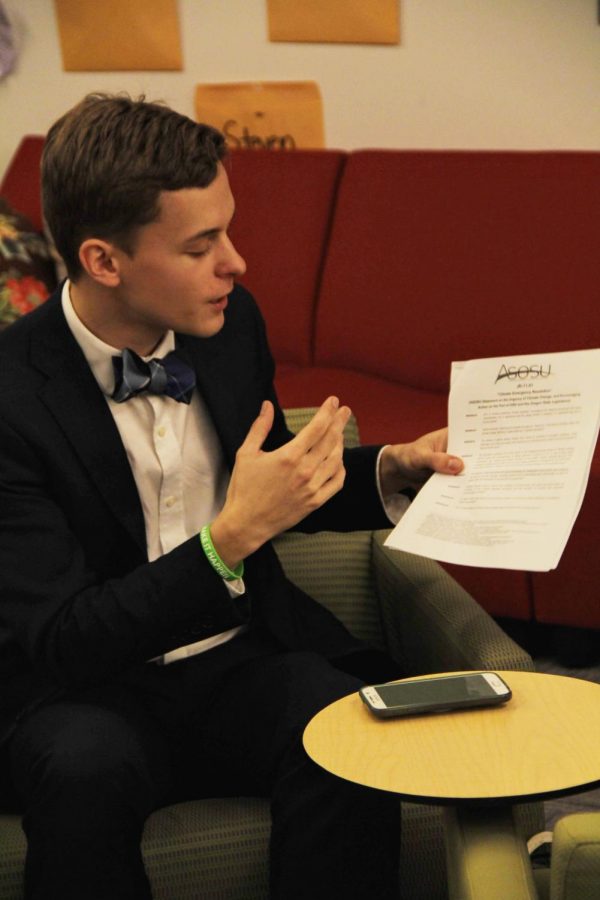ASOSU passes climate emergency resolution aiming to foster student activism, hold OSU accountable
January 27, 2020
Correction: This story originally inaccurately described the Environmental Council, and did not provide enough context regarding the bill’s goals. The story has been updated. The Barometer regrets these errors.
The Associated Students of Oregon State University—OSU’s student government—passed a climate emergency resolution that aims to hold OSU accountable to its carbon neutrality commitment, and to promote student-led actions in opposition to climate change.
The resolution was passed in the House and Senate in week 10 of fall term.
Nikolay Galtsev, ASOSU senator and second-year environmental science student, was one of the primary authors of the resolution, and said that he originally came up with the idea for the bill last fall, after President Donald Trump started discussing formally leaving the Paris Climate Agreement.
Galtsev said that at first he planned to create a climate fund for OSU, but felt that a consensus-establishing document was needed before larger structural changes could occur. He said that previously, members of ASOSU had been told by the OSU administration that the university wasn’t sure students would support changes to funding due to the climate crisis.
“We want to make major actions, to do major things to change this campus, to change the state, and to solve climate change,” Galtsev said. “So, in order to start doing that, we needed something like this that says the reason we’re going to start doing all of these things, the reason we’re going to start doing all of this climate action, is because of this, because this is an emergency.”
Additionally, the resolution was intended to give greater credibility to demands of climate activists on campus, and included language supporting the creation of student-led direct-action groups.
“We, by passing this resolution, are not automatically changing your entire life right now. But if you’re a climate activist, if this is something that’s important to you, then this resolution is not just a position paper of the student government, it’s also a tool,” Galtsev said.
Dylan Perfect, ASOSU coordinator of government relations and third-year student in political science, was another one of the authors of the resolution. Perfect described the resolution as an “open letter” of policy recommendations that was sent to both the OSU administration and the state legislature to show that students take climate seriously and expect follow through on commitments to emissions goals.
“So part of this is just trying to hold the university accountable and to make clear, as students, that this is an issue that we think needs to be front and center in terms of how we’re conducting ourselves as not only an institution of higher education but also as probably one of the largest energy users in Corvallis,” Perfect said. “What we’re mainly concerned with saying is that nothing is not an option. We need to, both as a state and as a university, take action on climate change, as soon as possible,” Perfect said.
Galtsev described the current state of OSU’s commitment to carbon neutrality.
“We made a promise as a university that we’re going to be carbon neutral by 2025, and the current sustainability officer is saying that’s not at all likely. It’s more like we’ve reduced 15% rather than carbon neutral, which is 100%. So, we need a new plan, we need a new way to commit to this,” Galtsev said.
Perfect said that one of the goals of the resolution was to recommit OSU to a realistic plan for combating climate change.
“I’d say the ideal response by the school is to come up with a realistic strategy for accomplishing the goals that they’ve heretofore set for themselves,” Perfect said. “And to be clear, I know that there have been strategic plans made and I know that climate change has not been ignored by the university, but I do think there’s an issue when we set goals and then we’re not able to follow through on them. And I think that’s not just Oregon State University, that’s across the board on climate.”
Perfect also suggested that students support action on the state level to combat climate change.
“This resolution, I think, is a great sort of statement of policy recommendations, but I think if I were to tell anyone to turn their attention toward something or to direct their efforts toward something it would be the Senate bill [1530] on the Oregon Legislature. Because I think students in particular need to make their voice heard on that.”
Coral Avery, ASOSU coordinator of environmental affairs, and was involved with the resolution through structure and content editing. They said that they worked on ensuring that the final resolution would be equally attainable to all students on campus.
‘Every student should be able to utilize this resolution and feel included in it no matter their identity or social status,” Avery said.
Avery also runs the Environmental Council, a forum for leaders of student climate groups.
“The resolution urges students to advance environmental initiatives by prioritizing climate action in many campus projects/initiatives, supporting student-led campus initiatives, and providing students with the appropriate mental health resources for the impacts of climate change,” Avery said.
Galtsev described what effect he thought the resolution would have on the future of OSU.
“This is the beginning of action, this is the call to action, and a justification for doing that,” Galtsev said. “I’m hoping to embolden student leaders on campus to basically facilitate and kickstart the action that we need…I hope that all of the research that we do that is very abstract will get applied in concrete ways because of student voices that are going to be emboldened by this consensus-making resolution.”


















































































![Newspaper clipping from February 25, 1970 in the Daily Barometer showing an article written by Bob Allen, past Barometer Editor. This article was written to spotlight both the student body’s lack of participation with student government at the time in conjunction with their class representatives response. [It’s important to note ASOSU was not structured identically to today’s standards, likely having a president on behalf of each class work together as one entity as opposed to one president representing all classes.]](https://dailybaro.orangemedianetwork.com/wp-content/uploads/2025/03/Screenshot-2025-03-12-1.00.42-PM-e1741811160853.png)
























